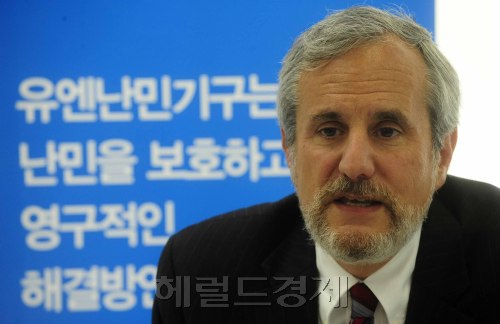It has been 19 years since Korea joined the Convention Relating to the Status of Refugees but the country still has a long way to go in protecting the lives and rights of displaced people seeking shelter, an expert says.
According to the Ministry of Justice, the country has received 3,073 applications for refugee status since 2001, when it first received asylum seekers, but so far only 235 have been granted it. Every year, about 300 people still seek refuge in Korea.
T. Alexander Aleinikoff, deputy high commissioner of the United Nations Refugee Agency, on Tuesday said the international body is willing to advise and support the Korean parliament regarding the implementation of a law protecting refugees in the country.
According to the Ministry of Justice, the country has received 3,073 applications for refugee status since 2001, when it first received asylum seekers, but so far only 235 have been granted it. Every year, about 300 people still seek refuge in Korea.
T. Alexander Aleinikoff, deputy high commissioner of the United Nations Refugee Agency, on Tuesday said the international body is willing to advise and support the Korean parliament regarding the implementation of a law protecting refugees in the country.

“I am pleased that the parliament is considering the Refugee Bill. UNHCR will provide technical help if requested,” Aleinikoff said Tuesday at a press conference in Seoul. His visit is the second among high-ranking officials of the international refugee agency following the high commissioner’s visit in 2003.
“The country will come with new commitments and bring a new world,” he said.
During his stay, Aleinikoff is scheduled to visit lawmakers and Minister of Justice to discuss a Korean legal system supporting the displaced people.
According to the bill now pending at the National Assembly, those who have filed for refugee status will be provided with legal consultation, interpretation services, lodging as well as allowance. The acknowledgement process should take no more than six months, after which the authorities should assist them in finding means of livelihood and adapting to life in Korea.
“We will be discussing various issues including how to bring up public awareness of refugees: why they need the status and what will become of them,” Aleinikoff.
He said the number of global refugees has hit the highest in 50 years, 43 million, and that recent political insecurities in the Middle East including Libya have raised interest in their rights.
He warned that climate change and other issues could create millions more refugees in the future.
UNHCR, dedicated to improving the lives of the refugees around the world, however, seemed less confident about measures regarding the swelling number of North Korean defectors.
According to the UNHCR report, the number of acknowledged North Korean defectors worldwide is 1,194 but the actual number of asylum seekers is much higher since a substantial number of them flee to a “third country” or seek naturalization from the first place they had fled to. The organization has been trying to persuade China, one of the largest refugee recipients but not a signatory to the refugee convention, to stop repatriating North Koreans in a bid to prevent them from receiving life-threatening punishments, but its efforts have so far been unsuccessful.
“There are ongoing discussions with the Chinese government. Refugee status should be given to someone who satisfies the definition under the convention,” Aleinikoff said.
By Bae Ji-sook (baejisook@heraldcorp.com)



















